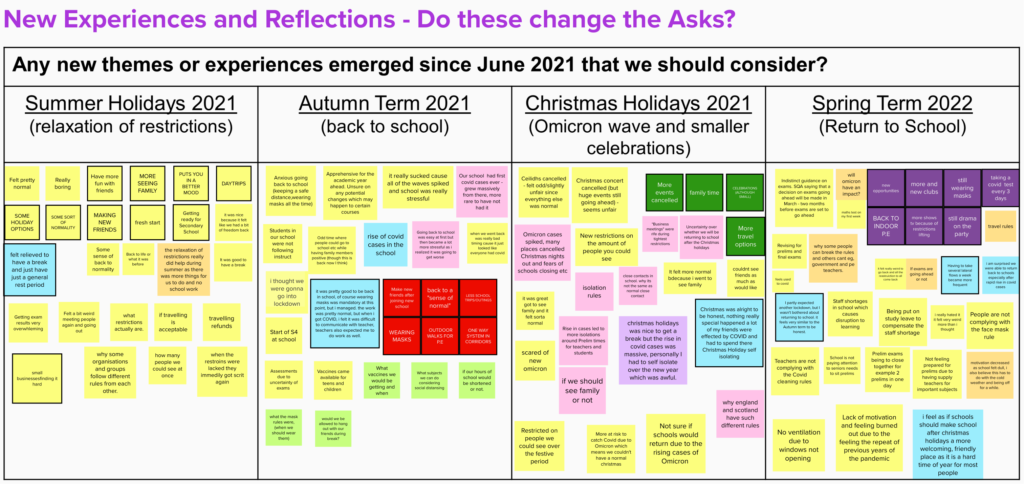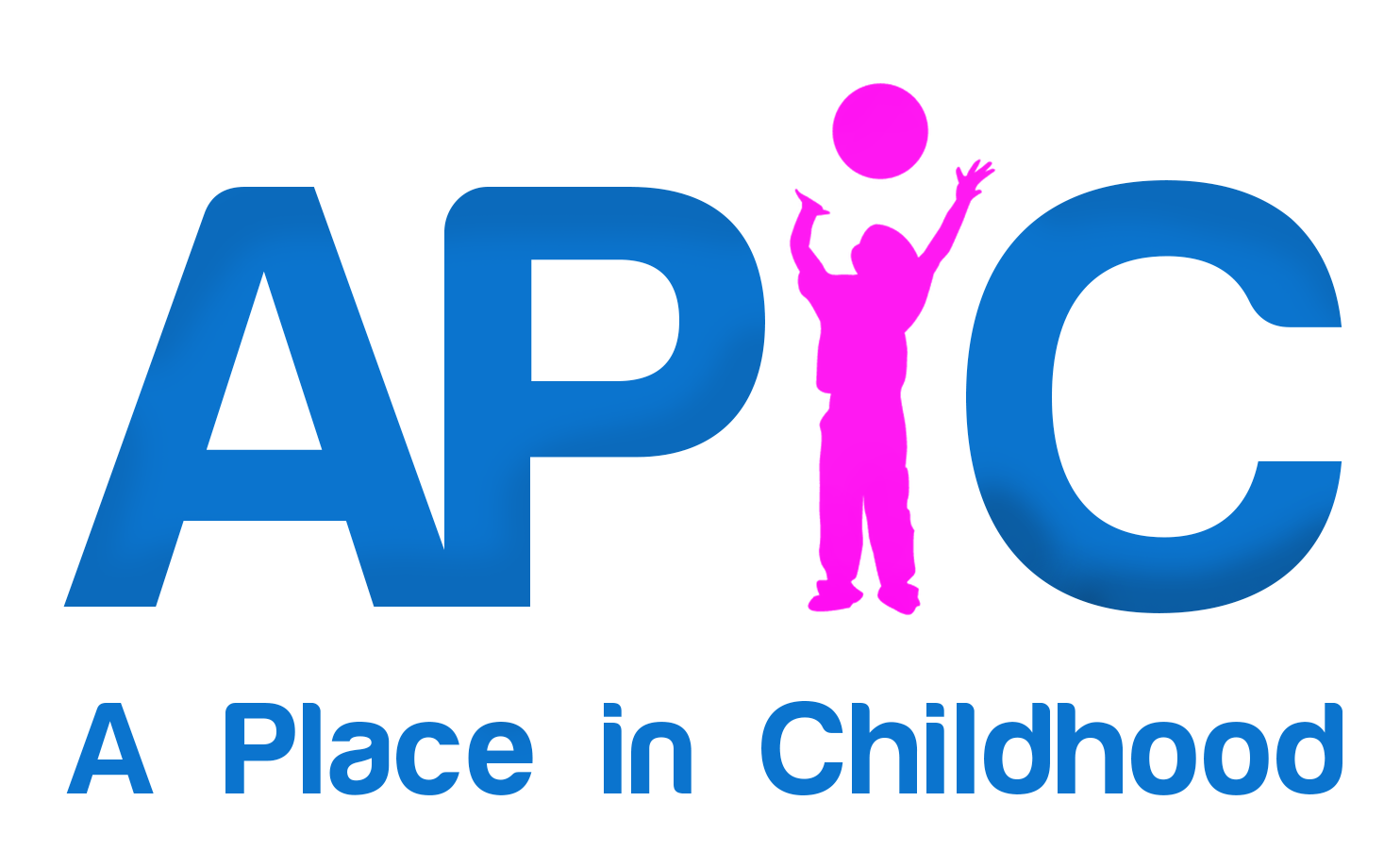On Monday 17th January 2022, we resumed workshops for STAGE 3 of APiC’s COVID-19 Project with Children and Young People. Supported by the Children and Young People’s Commissioner Scotland (CYPCS), #ScotYouthandCOVID3 has recalled the Young Consultants who participated in our original two stages of the project.
The study is a participant-led project involving teams from Aberdeen, Edinburgh, Glasgow, and (Rural) Stirlingshire and Falkirk, each with 4-6 boys and girls, aged 10-16 in the first round, and now ages 12-18. We ended #ScotYouthandCOVID2 with a set of 34 Asks to Scottish Government to improve children and young people’s experiences now and in the future. Our Young Consultants also devised a strategy to create a Manifesto for Children and Young People’s Rights in Recovery that supports the needs of as many across Scotland as possible.
In this next stage, we will fulfil the Young Consultants’ strategy from #ScotYouthandCOVID2. We will hold more workshops with them, primary school children, and seldom heard groups. We will then release a survey to check the content of our manifesto, which will be open to all children and young people across Scotland. We will be blogging our progress across this project, so stay tuned for developments!
#ScotYouthandCOVID3: Young Consultant Workshop 1
We began this workshop with a task to fill in any new themes and experiences that have emerged in the lives of our original Young Consultants since June 2021. Below you can see the grid they filled out together in groups, on our shared Mural Whiteboard.

This task surfaced a wide range of insights and experiences, but it was the latter half of the Autumn term until now that presented them the greatest challenges. This time frame corresponds to the Omicron wave of Coronavirus that has been affecting Scotland, and leading to increased fear, anxiety and uncertainty. In this blog, we report initial insights into what it’s been like to learn and meet the requirements of our education system during this latest development in the COVID-19 pandemic.
An Ever-Uncertain Learning Environment
Below is the fully-filled out grid that incorporates all of our Young Consultants’ responses from Autumn to now. You can view the whole thing and zoom in here. The recent return to school especially highlights the severely disrupted nature of their current learning environment. While they agreed being back at school was better than online learning, there was an expectation that the system would have adapted to the situation:
‘We pretty much had high hopes for this year. Obviously, we knew that COVID was still going to be having an affect this school year, but we thought, you know, the Scottish curriculum, would sort of learn from previous mistakes, and sort of, like, be improved – that we would actually get, back to some sort of normality.’

While there is significant variation in experience across schools and across school years, there were shared anxieties related to ongoing uncertainty and lack of clarity. For everyone, this included anxieties around catching COVID-19 at school. Some also reported fears and frustration around sporadically enforced school COVID-19-related rules, as well as inconsistencies in the rules themselves when compared across the school or society as a whole. For instance:
‘We had all of our like, really good events that we normally had. They’re all cancelled, like Ceilidhs and stuff… But then it was kind of weird how, you know, you can go to nightclubs…’
Our Young Consultants in S4 and above were especially concerned about the uncertainties surrounding their assessments this year, with some sitting prelims in the Autumn term and again in the Spring term so that evidence would be available should SQA cancel exams again:
‘We had prelims before Christmas, they were like really, really crammed in for Christmas, like the school was just like flooding us with information, which we learned… And now because of the uncertainty, which is caused by the SQA, and they’re sort of late timings, that our school is being extra extra cautious and having another set of prelims, which is great if they want evidence for us and like getting new grades, and it’s great if they do just give us our grades based off of evidence. But in terms of like, stress, and coping with stress, it’s not good at all!’
Others were unsure if and when their prelims would go ahead, and when they would hear a decision:
‘And we’ve had no certainty of prelim dates being given – just estimated, no confirmed times, nothing like that. So just basically same as last year’
The added stress of learning amidst such uncertainty was taking a toll on the wellbeing of Young Consultants and their peers. They worry their grades will not account for the circumstances of their learning experiences, and that the needs of the current assessment system are getting in the way of true learning. Many shared struggles around feeling like they’d given up with school recently, and they felt they were receiving mixed messages:
‘I feel like I went in a school with a positive mind set and I just sort of gave up. It wasn’t very good. Especially since like, I had COVID and stuff like that. And I was still expected to do work. And yeah, it’s just quite similar to last year…’
‘Omicron happened. And It was just like, there’s no point anymore.’
Recent staff shortages have also meant some Young Consultants were getting different teachers every day for the same subject:
‘it’s to the point where they all teach differently, they give us different things. We’re doing different pieces of work every single day. And the teachers just don’t know what we’re doing. And we’re getting teachers that don’t teach that subject.’
‘basically, we’re just trying to survive school at this point’.
Putting Children and Young People at the Heart of Learning
Young Consultants emphasised that we need to find ways to fairly and effectively assess attainment – now and for the future. While a move to a continuous assessment model was one of their 34 Asks at the end of #ScotYouthandCOVID2, they were no longer sure that this was the solution. They feel that much wider engagement with children and young people is required.
At the end of the workshop, we began discussing what a fair system might look like, and the conversation surfaced some key principles. We will continue to discuss these with Young Consultants as we progress this project and seek to understand how we can make a better learning environment for all children and young people as we recover from the pandemic.
What’s Next?
We will be convening workshops with primary school children and seldom heard groups over the next couple of months, before reconvening with our original Young Consultants to discuss our findings. If you are interested in finding out more about this project, or getting on the mailing list to receive a link to our Scotland-wide survey later in the year, please get in touch with Dr Jenny Wood at jenny.wood@aplaceinchildhood.org
We will be posting further updates on this project as we go, so follow us on Twitter for updates. We will also be writing a report at the end of the project, to chronicle our journey to the Children and Young People’s Manifesto for Rights in Recovery.
Read about wave one and wave two of #ScotYouthandCOVID here.
